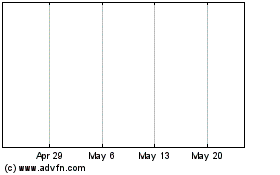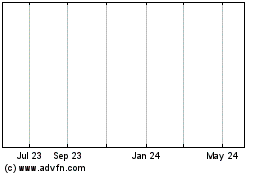2nd UPDATE: UK Banks Take Stock Of Businesses Taken On In Crisis
August 16 2011 - 2:12PM
Dow Jones News
U.K. banks are taking stock of troubled companies they took over
when private equity owners were unable to meet debt repayments on
large loan packages taken out to finance leveraged buyouts during
the boom.
Lloyds Banking Group (LYG), Royal Bank of Scotland Group PLC
(RBS), HSBC Holdings PLC (HBC) and Barclays PLC (BCS) all own of
hundreds of companies via debt-for-equity swaps, the preferred
option to writing-off their investment when performance turned
sour.
Having nurtured these companies back to health via
restructurings and operational support, the banks are taking very
different views of their continuing roles as owners. Some are
looking to get their money back and boost their balance sheets in
the face of increased capital regulatory requirements. Others are
keen to capitalize on their improving businesses and are injecting
more capital and in some cases inviting private equity firms to
invest and become additional shareholders.
Whatever the strategy, private equity firms are eyeing the
pipeline of fresh opportunities. Buyout experts say that the
selling banks sense that pricing expectations are more equally
matched than before, while the would-be owners among the banks want
to capitalize on companies that have been turned around and are
poised for growth.
"Banks will sell some assets, but will also continue to own some
exciting companies that can't be allowed to stagnate. Many will
need substantial investment capex to maximize their potential--in
these circumstances the bank may look to partner with other
investors," said David Whileman, Partner at 3i Group PLC (III.LN)
U.K.
"The good companies with this new investment can pursue more
opportunities, yielding more money for the taxpayer once the banks'
stakes are finally sold," he added.
Lloyds, which is 41% state-owned, falls firmly within the former
camp and is currently inviting banks to pitch for the mandate to
sell Garden Centre Group, one of the U.K.'s largest garden center
companies. It is also expected to put high street hardware retailer
Robert Dyas on the block later this year or next.
It took control of both companies via debt-for-equity swaps a
few years ago, and the pace of sales is likely to reflect the
strategy of the bank's new chief executive, Antonio Horta-Osorio,
according to experts.
"Banks are not traditional long-term holders, but the new chief
executive may well be accelerating the pace of sales--he would
rather not have the exposure," said Michael McDonagh, private
equity partner at KPMG.
Since his appointment in March, Horta-Osorio has already
expedited the sale of the bank's retail branch network and recently
said that the bank is making "substantial progress" in the strategy
he set out in June, which includes shedding international
operations and cutting costs by GBP1.5 billion within three
years.
By contrast RBS, which is 83%-owned by the U.K. government, is
keen to remain an owner if it sees upside in a company's
growth.
"We are definitely at the more active end of the spectrum," said
John Davison, global head of RBS's Strategic Investment Group,
which handles all aspects of the equity positions that the bank
takes through debt-for-equity swaps and new money investments in
restructuring situations. SIG has 320-350 companies in its
stable.
Just last month, the bank wrote off all its debt and took
control of Fairline Boats, the luxury yacht and powerboat-maker
owned by 3i Group.
"We have put in additional capital together with Better Capital
and are working together on an operational turnaround of the
business," Davison said.
Similarly, RBS has recently taken control of Sweden's largest
shopping center operator, Centrum Kompaniet as part of a
restructuring originally triggered by the collapse of Lehman
Brothers, which was an equity holder alongside majority owner
Boultbee. RBS was senior lender to Boultbee in its leveraged buyout
of Centrum Kompaniet in 2007. RBS subsequently paid Boultbee a
nominal sum for its shares, writing off the bank's debt, Boultbee
Chairman Steven Boultbee Brooks told Dow Jones Newswires.
The 10 shopping centers are valued at around EUR800 million and
RBS is widely expected to put the retail properties back on the
market in the short term or at least invite other shareholders
in.
It has also taken some through to successful exits. For example,
it recently floated U.S. luggage maker Samsonite International S.A
(1910.HK) in a $1.25 billion IPO in Hong Kong. RBS had become joint
owner with CVC Capital Partners in 2009 after the crisis hit
performance, forcing CVC to inject more capital while the bank
swapped some of its $1.43 billion buyout debt for equity.
And in May, RBS sold Heath Lambert, the Lloyd's insurance
broker, to Arthur J Gallagher & Co. (AJG), one of the world's
largest insurance brokers for GBP97 million. RBS had become joint
owner with other investors after various debt for equity deals and
restructurings--the bank originally invested in the business in
2005.
HSBC's ownership via debt-equity-swaps includes camera chain
Jessops, which it took over in 2009, while Barclays Ventures took
control of U.K. health and fitness chain Total Fitness of in a
debt-for-equity deal from LGV Capital last November.
Representatives for HSBC and Barclays declined to comment for
this article.
-By Marietta Cauchi, Dow Jones Newswires; +44 207 842 9241;
marietta.cauchi@dowjones.com
Lehman (NYSE:LEH)
Historical Stock Chart
From Jun 2024 to Jul 2024

Lehman (NYSE:LEH)
Historical Stock Chart
From Jul 2023 to Jul 2024
